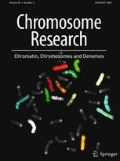
It is a great pleasure to welcome Dr. Tatsuo Fukagawa as an associate editor on the Editorial Board of Chromosome Research. Tatsuo (“Tats”) received his Masters in Microbiology from Hokkaido University in 1993, and his Ph.D. in Genetics from the Graduate University for Advanced Studies (Mishima, Japan) in 1995. After 4 years of postdoctoral work in Ed Southern's Lab within the Department of Biochemistry at the University of Oxford (UK), he joined the National Institutes of Genetics (NIG) as an assistant professor where he has rapidly risen through the ranks to professor as of 2008. The NIG serves as a center for various genetic resources including mutant strains, clones, and vectors, and it houses the DNA Data Bank of Japan and a DNA sequencing center. Tatsuo also holds an academic appointment in the Department of Genetics of the Graduate University for Advanced Studies (SOKENDAI).
Tatsuo began using chicken DT40 cells, which show a high rate of homologous recombination, when he was a post-doc at Oxford. During the mid to late 1990s he and William Brown (also at Oxford) established a potent approach for efficiently creating selected conditional knock-out DT40 lines. He still uses DT40 cells in his work at the NIG which currently focuses on kinetochore/centromere structure and function. Using a proteomic approach, his group has identified dozens of new kinetochore components and he has made correction of knock-out cell lines for many of these proteins. This correction includes knock-out cell lines for 17 kinds of CENPs (constitutive centromere proteins), other kinetochore components, chromatin remodeling proteins, histone variants, and RNAi components such as Dicer and Ago proteins. Needless to say, he is a heavily sought after and generous collaborator.
A major goal of Tatsuo's highly visible and prolific lab is to understand the molecular mechanisms that direct kinetochore/centromere specification, facilitate contacts with chromosomal DNA, and drive kinetochore assembly. He is also working to understand the molecular mechanisms of how the kinetochore interacts with spindle microtubules.
Tatsuo Fukagawa's specific areas of expertise include chromosome structure, chromatin biology, nuclear structure, and cell cycle regulation, all of which he approaches with the most modern of techniques and technology.
Conly Rieder and Herbert Macgregor
Author information
Authors and Affiliations
Corresponding author
Rights and permissions
About this article
Cite this article
Rieder, C., Macgregor, H. A new associate editor. Chromosome Res 19, 153 (2011). https://doi.org/10.1007/s10577-011-9189-4
Published:
Issue Date:
DOI: https://doi.org/10.1007/s10577-011-9189-4

